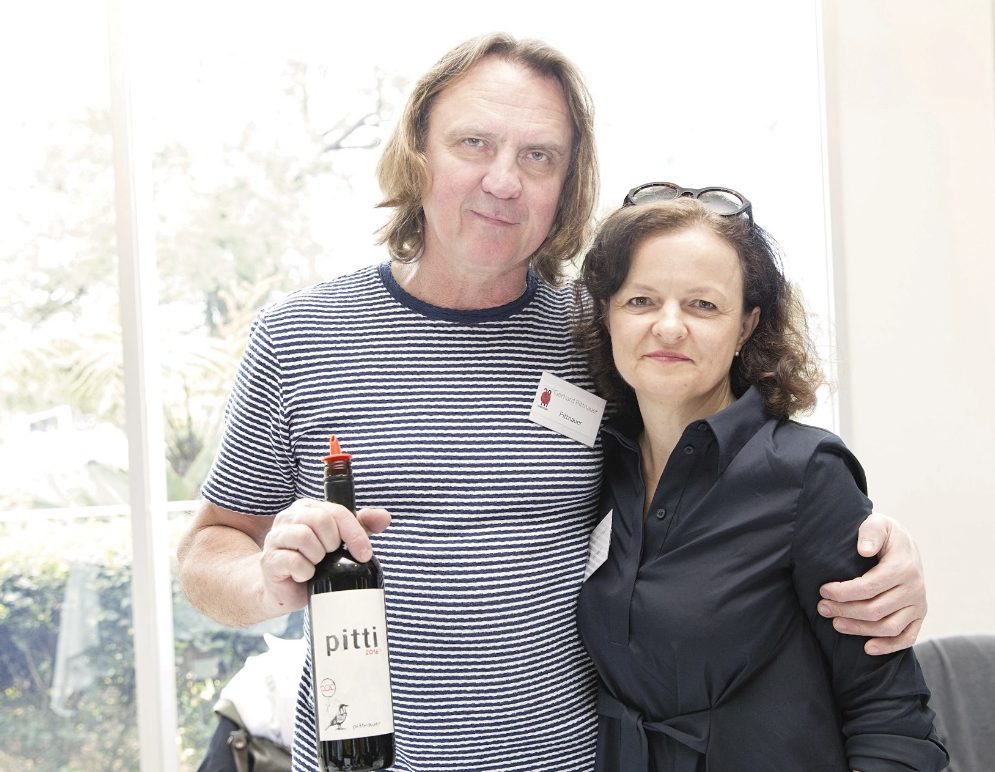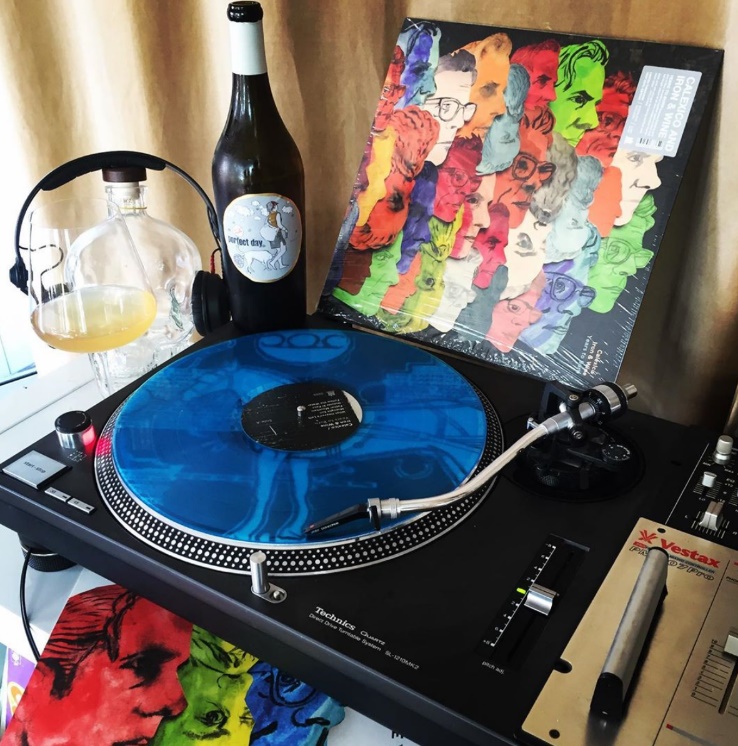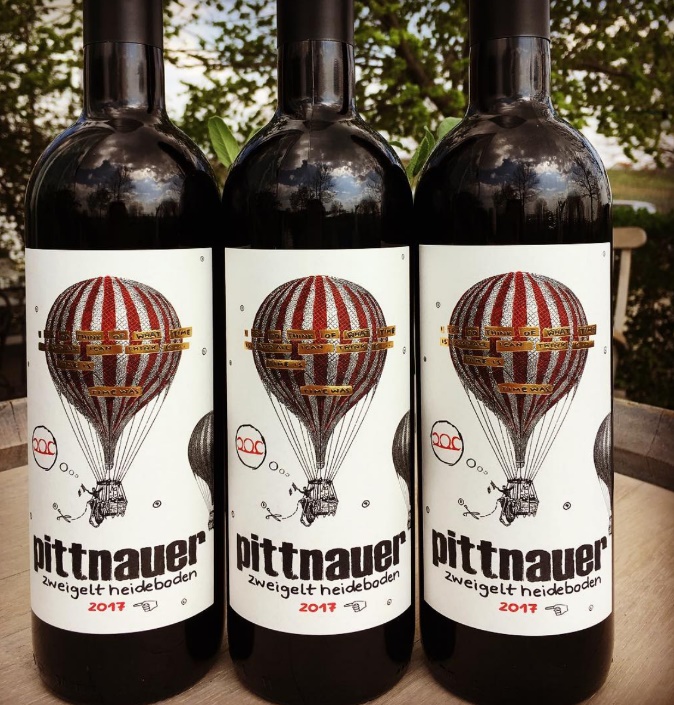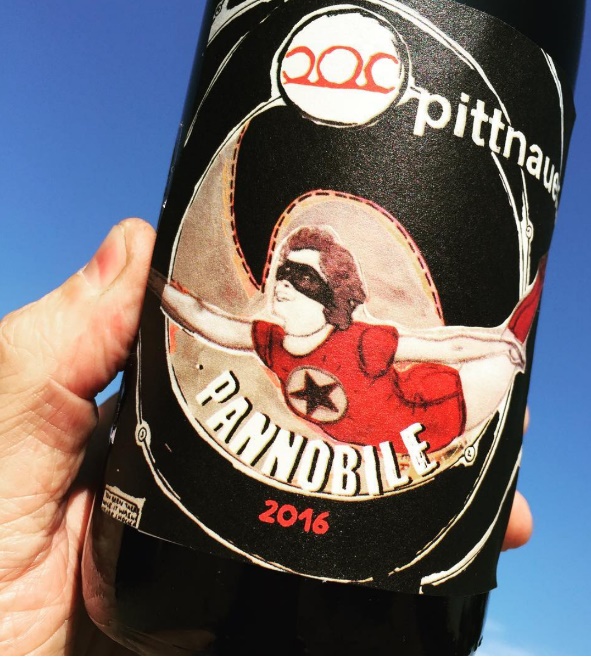Winter 2019 Offer
“A short digression into punk history: a mosh pit (and occasionally indeed mash pit) is the area directly in front of the stage where hardcore fans pogoed without fear of skin contact.” Not your average tasting-note intro – but then Gerhard Pittnauer isn’t your average winemaker and he doesn’t grow your average wines.
The wine he’s talking about there is the 2017 Mash Pitt, the most beguilingly complete amber wine to make it into the CellarHand portfolio and more than a match for anything occupying this spot on a list. It’s one of three totally addition-free (including SO2) wines arriving in this new shipment, alongside the new vintages of Pitt Nat and Perfect Day. Of course, everything here now is biodynamically certified and crafted with 100% soul and zero intervention, with the likes of Pitti, Pittnauski and Pannobile getting nothing other than a protective dose of sulphur.
Once again, the presence of Gerhard and Brigitte Pittnauer at our 20th Anniversary tastings in February left many people enchanted by their warmth, humour and wine-growing flair. We wholeheartedly hope you’ll continue to seek out and share these life-affirming wines.
 THE WINES
THE WINES
2018 Pitt Nat Rosé RRP $57
A méthode ancestrale sparkling blend of Merlot and Syrah from sandy, clayey soils with moderate levels of chalk. Fermentation starts in stainless steel and is completed in the bottle. Alcohol 11%; TA 5.1g/L; RS 6.8g/L.
Like other ground-breaking movements, the natural wine avant-garde didn’t come out of the blue. Most of its methods were already used before but a lot of them were forgotten or neglected in times of increasingly unifying and global trends. Sparkling wines produced in the méthode ancestrale – so called “pét nats” (pétillant-naturel) – are a prime example. Pét nats run through a second fermentation in the bottle and their production demands care and experience. Done well, they produce great results. They’re without any doubt more interesting and quaffable than whatever comes out of a pressure tank. Which is why they were reborn by a group of young French winemakers some years ago and in the meantime made their leap to Gols.
The selection of Merlot and Syrah as main grapes for the Pitt Nat Rosé is a tribute to the homeland of the Pét Nats (and also rosé). Grapes are whole bunch-pressed, spontaneously fermented and bottled with 20-25 grams of residual sugar still left to ferment. This happens in the bottle where the remaining sugar transforms into carbon dioxide and alcohol. After a December night out in the cold (to freeze the yeasts in the bottleneck) our pét nats get disgorged and refilled with the same wine.
This wine was already in last year’s incarnation fun to drink at breakfast, lunch, dinner, New Year’s Eve, in spring, summer and autumn – nothing has changed there, although the flavours are slightly different. It has the colour of a pink grapefruit and tastes a little bit like it. Furthermore it brings together raspberries, rose petals and watermelon. It is enticing and dynamic. It fizzes fresh and vibrant over the finish line. – Gerhard Pittnauer
2018 Pittnauer ‘Pitti’ Rosé RRP $26
Blaufränkisch grown on vineyards of Heideboden, onnsoils that are sandy and clayey with a little chalk. Fermented in stainless steel. Alcohol 12.5%; TA 6.3g/L; RS 1g/L.
When we bottled our rosé for the first time in 2004 we had in mind a wine that we could quaff after returning home from a long and hot summer’s day of work – a wine that should bring us back to life, crisp and youthful and with the ability to counter fatigue. Soon we discovered that not just we but also the public enjoyed the idea of an easy-to-drink wine of quality. In the meantime it gained a huge fan base and can be found in restaurants, bars and wine shops from Austria to Australia.
The grapes for the rosé grow in the same organically-cultivated vineyards as our red grapes – they are just harvested a little bit earlier. It’s almost completely made of Blaufränkisch which gives it a lively acidity and a subtle spiciness.
The wine is joyful, light-hearted and inviting – fun with a little bit of seriousness. Bone dry, straightforward and fresh. Red berries. Lemony. Zesty. Quaffable. Thirst-quenching. A wine that fits every occasion and combines perfectly well with deep-fried food (think schnitzel & co). – Gerhard Pittnauer
2018 Pittnauer Perfect Day RRP $49
A blend of Chardonnay, Muskat Ottonel, Gelber Muskateller and Pinot Blanc grown on the heavy clay soils of the Altenberg vineyard in Gols. Matured in in 500-litre puncheons and 1000-litre foudres. Alcohol 12%; TA 4.6g/L; RS 1.5g/L.
Perfect Day, one of our favourite projects, is on one hand a tribute to the eponymous 1972 Lou Reed song where he sums up the simple joys of life into one perfect day. On the other hand it’s an ambitious attempt to create a wine to accompany such a day.
Gelber Muskateller and Muscat Ottonel were harvested and fermented separately but vinified in the exactly same way – which means that they started fermentation with the grape-skins. After a week we pressed them and subsequently fermented them to dryness in 500-litre oak barrels. Pinot Blanc and Chardonnay were pressed immediately and fermented together in 1000-litre and 500-litre oak barrels. After six months the four grapes were blended right before bottling. The Perfect Day was neither filtered nor sulphured.
The wine is energetic, fragrant, lively and tender. It’s an alternative to the rich and sumptuous interpretations of other skin-contact wines. White flowers, peaches and pebbles shape the aroma structure, but allow other flavours to enter with time and air. The texture is dense and tightly knit, the acidity agile and dynamic. Long and lively finish. – Gerhard Pittnauer
 2017 Pittnauer Mash Pitt RRP $57
2017 Pittnauer Mash Pitt RRP $57
A blend of Chardonnay, Grüner Veltliner and Sauvignon Blanc from rich clay soils of the Lichtenberg vineyard in Rosalia and the Altenberg site in Gols. The wine is matured for eight months in used barriques. Alcohol 12%; TA 5g/L; RS 1g/L.
A short digression into punk history: a mosh pit (and occasionally indeed mash pit) is the area directly in front of the stage where hardcore fans pogoed without fear of skin contact. Likewise our Mash Pitt is not stingy with skin contact. For 20 days mash and must stay together, until all the pigments and tannins inside the skin have integrated into the fermented wine. What goes without saying in red wines gets nerves jangling when it comes to white grapes – and that is exactly what the Mash Pitt is made from.
There’s actually no need (but also some good reason) to be overly excited; the consequences are a massive improvement to the once monochrome white-wine colour scale. Tannins add energy, vitality, tension and power – as well as distinct aromas which unfold to reveal previously unknown aspects of the vinified grape varieties.
The wine is dark yellow with orange hints. The nose shows petals, peaches, yellow fruits and aromas of tea and herbs. While initially soft and round, things take a different direction when suddenly and synchronously tannins and acidity kick in. The wine’s structure changes and gets more direct and taut. The finish is compact, elegant, focused and precise. – Gerhard Pittnauer
Slightly cloudy but with an immensely aromatic nose, this suffuses with orange blossom, white pepper, bruised apple peel and jasmine. The palate rings with these aromatics while remaining utterly slender, utterly poised, utterly fresh. This clearly is skin-fermented and thus brings a deliciously bitter phenolic edge. Elderflower hovers. The aromatic purity and floral citrus poise are astonishing. Lovely. 94 points. Anne Krebiehl, Wine Enthusiast March 2019
2017 Pittnauer ‘Pitti’ Red RRP $26
The grapes are grown on black soils around Heideboden. The wines spends 12 months in stainless steel, for a blend that is all about drinking pleasure.
Pitti 2017 is a cuvée made out of the indigenous red wine varieties Zweigelt and Blaufränkisch, supported by the international grape Merlot. The fullness and juiciness comes from the Zweigelt, the spiciness from the Blaufränkisch and the structure from the Merlot.
It’s dark ruby in colour, with purple tints. The attractive bouquet shows dark blackberry, nuances of tobacco and a bit of liquorice. The palate has tight tannins with black berries. It’s complex with fresh acid structure and potential to develop nicely in the medium term. – Gerhard Pittnauer
Cranberry meets sarsaparilla meets cherry cola aromas. Crunchy textured, shows more of the cherry cola, cranberry juice flavours, crisp texture, ultra fresh feeling, good dusting of spice, peppery finish and corkscrew of tannins in tow. Great drinking here. 92 points. Mike Bennie, The Wine Front
2017 Pittnauer Zweigelt RRP $32
100% Zweigelt, a variety formed from crossing Sankt Laurent and Blaufränkisch, is handpicked from the organically farmed, sandy, clay and black-earthed soils of the Heideboden Vineyard in Burgenland. The 2017 Pittnauer Zweigelt Heideboden is a low-intervention wine with old barrique barrel aging for 12 months. Alcohol 13%; TA: 5.4g/L.
Supple black cherries, plum, spices with mineral astringency, well integrated tannins and complexity.
Very ripe, almost overripe black cherry on the nose promises generosity. The palate dials this back to present ripe, fresh, aromatic and juicy black and red cherry in a lovely, light, juicy and smooth package. 89 points. Anne Krebiehl MW, Wine Enthusiast July 2019
 2017 Pittnauer Blaufränkisch RRP $32
2017 Pittnauer Blaufränkisch RRP $32
Dynamic and vibrant, the 2017 Pittnauer Blaufränkisch Heideboden showcases the terroir of the clayey, brown soil & organically farmed Heideboden vineyard. 100% hand-picked fruit naturally fermented from wild yeast and aged on lees for 6 months in old oak. Alcohol 12.5%; TA: 5.7g/L; RS 1.0g/L.
This wine is juicy, fruit driven and vigorous. An elegant array of cherries, redcurrants, pepper and cinnamon spice with lifted rose petals. Bright acidity emphasises the energy the 2017 Pittnauer Blaufränkisch Heideboden brings. – Gerhard & Brigitte Pittnauer
The nose gives little away but the palate comes in with a juicy easy aromatic freshness that sweeps plum, plum skin, crushed blackberry and a little tar in its lively wake. This is sinuous, light but full of life and fruit. Drink soon. 91 points. Anne Krebiehl MW, Wine Enthusiast July 2019
2018 Pittnauer Pinot Noir RRP $39
The fruit comes from the gravelly brown soils of the Goldberg, Zwickelacker and Holzacker vineyards. Matured in 500-litre wooden casks.
Pinot Noir stands in big letters on the label and Pinot Noir also takes centre stage in this wine. Origin is – as always – important but here it backs down in favour of the variety. Since Pinot Noir reigns as one of the great translators of terroir, this might come as a surprise. But what is true for Burgundy and other lime-based regions – the calcareous soils of the Leithaberg, for example – does not apply to our vineyards: our grapes come from the plains of the Parndorfer Platte and its flat, sandy and windy plots. It is no terroir for subtle and complex, soil-driven Pinot Noir but one where the tender, radiant, vivid, precise, immediate and captivating delicacy of the fruit gets all the glory. Fermentation takes place in stainless steel tanks, followed by maturation in 500-litre wooden barrels.
It’s velvety. Smooth. Red fruit everywhere. Cherries and strawberries. Ripe and juicy. Initially round and soft, it tapers along its way through the mouth and runs straight as a train over the palate. It combines substance with drinkability and levity with depth. One of the few red wines that will go perfectly well with fish. – Gerhard Pittnauer
2015 Pittnauer ‘Pittnauski’ RRP $49
MAGNUM RRP $103
The Pittnauski is a very personal wine to Gerhard Pittnauer, one that he has longed to create. Using his decades of knowledge and experience, Gerhard has created a wine that isn’t driven by tannin and alcohol but subtlety, all the while expressive and complex. Fruit for the blend comes from Gerhard and Brigitte’s best vineyards Rosenberg (sandy), Altenberg (clay) and Ungerberg (loam), located in Austria’s northern Burgenland. It’s composed of Blaufränkisch, Zweigelt and St. Laurent (roughly 40:40:20). Separately fermented and vinified, the wines are aged individually in barrel. Once combined the blend is bottled without filtration.
A wine that glides over the palate, just medium weight, succulent with firm but lacy tannins, good acidity, loaded with cherry flavours and dried herb character. Feels understated in the best possible way, one to whisk around in a big glass and settle in and watch open. Such a good vibe here. 93 points. Mike Bennie, The Wine Front April 2019
2016 Pittnauer Dogma Blaufränkisch RRP $64
Hand-picked Blaufränkisch from our best vineyards: Rosenberg, Altenberg & Ungerberg. Dogma refers to the manifest of the Danish group of directors led by Lars von Trier and Thomas Vinterberg who, by focusing on the raw material and reducing their films to the essential, created uproar in the movie scene. We tried to translate their so-called “vow of chastity” consistently and uncompromisingly into wine.
Which means: no technical ingenuity, dramaturgical predictability, illusions and special effects. Instead, just biodynamically cultivated grape material, spontaneous fermentation and authenticity. And: no temperature control, filtering or addition of sulphites.
Apropos SO2: If everything goes well, wines without sulphites are a little bit like children. Candid, honest, welcoming and without double-talk, they express a captivating naturalness.
Fleshy and flowery, some spices and dark berries, peppercorns and cherries – however, the flavours are in constant flux. And why not? Our Blaufränkisch Dogma is alive and versatile, a perpetual adventure for us and for you. Crisp and vital acidity calls the tune on the palate which is balanced by a smooth and tightly meshed texture. – Gerhard Pittnauer
2016 Pittnauer Pannobile RRP $64
Certified biodynamic blend of Blaufränkisch and Zweigelt from the Ungerberg. Rosenberg, Altenberg and Setz vineyards. Soils are sandy and clay with some chalk. Matured for 20 months in used barrique barrels.
Pannobile is the individual interpretation of a mutual brainchild. Created by the nine members of the eponymous winemaker collective, Pannobile is an idea which has stood the test of time. Sense of place and grape variety – or better grape varieties – of the region take centre stage. And – an unwritten rule of our group – it is at least a couple of them; in our special case Blaufränkisch & Zweigelt make up equal parts. However, depending on the vintage, this emphasis can change. We choose our grapes from separately fermented batches of our best vineyards between Weiden and Gols which we taste meticulously before we combine them. Zweigelt provides a broad and succulent body which is balanced by the muscles and dynamics of the Blaufränkisch. Ageing takes place on the lees in used barriques and 500-litre wooden barrels for around 18 months.
The new Pannobile is evidence that 2016 was a brilliant year for blithe, subtle and invigorating wines. The flavours are precise: red-berried and gently highlighted by herbal insinuations. The mouthfeel is cool and delicate, shaped by a fresh and vital acidity and firm tannins. The body unifies elegance and energy and gives way to a focused and multi-layered finish. – Gerhard Pittnauer
